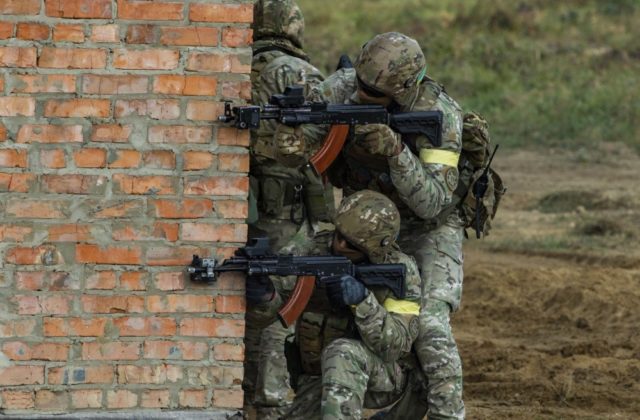
Ukraine offers to pay Russians who surrender, while Pentagon assesses Moscow’s nuke posture Ukrainian soldiers from the special police force traverse a corner during a fire team movement and room clearing demonstration. (U.S. Army photo by Pvt. Joanna Gaona Gomez)
As intense fighting continues in Ukraine, the country is offering Russian troops amnesty and money to surrender, Ukraine’s defense ministry said Monday on its official social media channels.
“We offer Russian soldiers a choice: to die in an unjust war, or full amnesty and 5 million rubles of compensation if they put down their guns and voluntarily surrender to prison,” the ministry said on its official Facebook page and Twitter account.
As of press time, that was about $48,000.
«Ми пропонуємо російським солдатам вибір: загинути на неправедній війні або повну амністію та 5 млн. рублів компенсації. Якщо вони складуть зброю і добровільно здадуться у полон» – @oleksiireznikov
Більше тут ➡️ https://t.co/w8GW2ye2JF pic.twitter.com/28K3BDMtKW— Defence of Ukraine (@DefenceU) February 28, 2022
The offer is meant to further hinder the Russian advance on Kyiv, which has been stalled by logistics failures.
“They ended up having to rely on fuel and sustainment capabilities earlier in the process than what we believe they had planned to do,” a senior defense official told reporters at the Pentagon. “So on day four they’re running out of gas, and they’re having logistics problems.”
More than 5,300 Russian troops have been killed and hundreds captured in just five days of fighting so far, according to the Ukrainian defense ministry.
“A lot of them are very young. The Kremlin turns them into criminals, turns them into murderers. Some of them were deceived,” ministry officials said. “Ukraine is a civilized country. All prisoners are safe, they are being helped. They already communicate with loved ones.”
Officials said their message to Russian troops is: “You have a chance to start a new life. Make a choice. Leave without a weapon with a white flag. Say a code word: ‘million.’ Live a life. Give your family a hug. For those who will continue to behave like an occupier — there will be no mercy.”
Russia’s supply problems could bring their own risk, the U.S. defense official acknowledged, because it could drive Russian president Vladimir Putin to escalate to deadlier options.
On Sunday, Putin put his country’s nuclear deterrence force on a “special regime of combat duty.” The senior defense official said that the Pentagon is still assessing what that new posture means.
“The way he [Putin] characterized it, ‘special combat duty alert’—think he called it something like that—it’s not a term…in what we understand to be Russian doctrine. So that’s why we’re still analyzing it and reviewing it to try to understand what exactly it means,” the senior defense official said.
But the U.S. has not seen any change in Russia’s nuclear force posture since Putin’s comments, nor have U.S. military officials communicated with their Russian counterparts to get clarification, so intent is difficult to determine, the official said.
“There’s no ‘hotline’ established with respect to the crisis in Ukraine,” the official said, in reference to a 1963 line of communication set up between the Kremlin and Pentagon to avert nuclear miscalculation.
___
© 2022 Government Executive Media Group LLC
Distributed by Tribune Content Agency, LLC.




